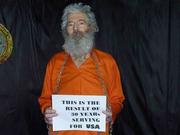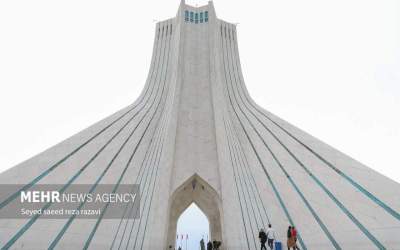 Mohammad-Hossein Aghasi, the lawyer for the family of former FBI agent Robert Levinson, who went missing in Iran in 2007, says Tehran should question another American allegedly involved in the case. Mosaddegh Katouzian conducts an exclusive interview with Aghasi for RFE/RL's Radio Farda.
Mohammad-Hossein Aghasi, the lawyer for the family of former FBI agent Robert Levinson, who went missing in Iran in 2007, says Tehran should question another American allegedly involved in the case. Mosaddegh Katouzian conducts an exclusive interview with Aghasi for RFE/RL's Radio Farda.RFE/RL: Former FBI agent Robert Levinson disappeared nearly six years ago on Kish Island in southern Iran while reportedly conducting a private investigation into cigarette smuggling. As his lawyer, you have retraced some of his steps and discovered he met with another American on Kish Island -- a man you feel could provide an important clue to who [may have] abducted Levinson and why. Could you tell what you have discovered on your trips to Iran over the past six years and what you know about the man you say Levinson met?
Mohammad-Hossein Aghasi:�I traveled to southern Iran more than once. At the time [I began], no one even believed Mr. Levinson had entered Iranian soil and that, if he had entered, that he had been abducted. After the investigations I conducted and the evidence I found and presented to the security and judicial authorities, it was proven that, yes, he had entered Iranian territory and spent 24 hours in a Kish Island hotel and had a meeting with an American who has found refuge in Iran.
So, he entered and stayed in Iran and had this meeting, but on his way to the airport to catch a flight back to the U.A.E., he disappeared. So this is where the investigations led to. And the judiciary really helped to see whether we could find a clue. But the will necessary for this matter to be investigated is absent.
RFE/RL: What is the name of the American you refer to?
Aghasi:�This American�s name is Dawud Salahuddin, whose American name is something else. A meeting took place between him and Mr. Levinson in Kish and they spent 24 hours together there.
RFE/RL: Dawud Salahuddin's birth name is David Theodore Belfield, and he was identified by the FBI as the assassin who posed as a mail-delivery man to shoot Iran's former press attache, Ali Akbar Tabatabai, at his home in Bethesda, Maryland, on July 22, 1980. Tabatabai had become an outspoken critic of then-Iranian Supreme Leader Ayatollah Ruhollah Khomeini and immediately after the killing Belfied fled to Iran, where has lived ever since. His history is well documented in an�investigative report�by "The New Yorker" in 2002. You have called for the Iranian judiciary to question Belfield about the Levinson case. Where do things stand with that request?
Aghasi:�The case is now in the security-related public prosecutor's office and it is in an interrogative branch. What I have requested is for Mr. Salahuddin to be summoned to the court. I need to find out whether the prosecutor has agreed to this or not. If this individual would really be made subject to investigations, it is probable that certain facts and events that we are unaware of would be revealed.
RFE/RL: Dawud Salahuddin is also known because of the role he played in [Iranian cinema director] Mohsen Makhmalbaf's 2001 film "Kandahar." Have you had the chance to talk to Mr. Salahuddin?
Aghasi:�I have also seen that film. I have had a meeting with Mr. Salahuddin. One of the problems I have is that I have even presented all the information -- along with photographs, interpretations, and details of the talks -- to the public prosecutor's office and we expect them to be reviewed. Because [Salahuddin] said things contrary to the truth, that has forced me to look at him as a suspect, to an extent.
RFE/RL: What exactly did Dawud Salahuddin tell you that makes you view him that way?
Aghasi:�[He shared] information which still has security aspects to it and is not expedient for it to be disseminated through the media, because sharing this information can both cause postponement and disruption in the case and create certain responsibilities for me. But he mentioned issues that I shared word for word with the judicial authorities.
RFE/RL: Mr. Levinson was�shown in a video�released by his abductors in November 2010, a video in which he asks for help in order to be released but does not say who holds him or where. Has he communicated anything that has not been reported in the media that gives more details about his fate?
Aghasi:�No, not at all. It is not clear who should be the negotiating party. Attempts have been made, in the past as well, to see if we need to negotiate with a person or persons for this to be done. Letters were sent and negotiations were done through the U.S. Interests Section in Iran with Iran's foreign minister. But it was just said at the time that Iran's government has no knowledge about this matter, just as it is being said now.
And as the Levinson family's attorney, I also believe that he was not arrested by real, official, and legal faculties and authorities or by Iran's security faculties. I also have convincing reasons for this claim. When I took up the case, and following conversations with his son and his wife, and based on the reasoning, evidence, and indications I observed, I noticed that the Iranian government has not done this. But there are those who may not hold official authority or who have not done this on behalf of the authorities yet who nevertheless determine his fate.
Once a mission representing the Iranian parliament and another time a mission representing Iran's Foreign Ministry was sent to the place where Mr. Levinson disappeared, and investigations were followed, but there were no clues to show that perhaps the Iranian official and legal authorities had him in their custody. As such, it is not possible to enter into negotiations and dialogue to discover his fate and the likelihood of his freedom. Everyone involved is trying to see where they can find a clue and who controls his fate. And no such attempt has led to success so far.
RFE/RL: How do things look as you go forward from here?
Aghasi:�Please take note of the fact that Ms. [Hillary] Clinton, the [U.S.] secretary of state, stated that Levinson was kept in a Southwest Asian country. This statement made my job a little harder. When I talk to [Iranian] judiciary officials, and especially the interrogator, about this case, the answer I get is, "When U.S. officials themselves say Mr. Levinson is not held in Iran, why are you looking here for your client?"
So for now, I am pursuing the abduction. This man has disappeared in Iran, which is the Iranian judiciary's jurisdiction, and I believe he has been abducted. We will pursue the abduction case to see whether Iranian security and judiciary authorities might find individuals responsible for his abduction and prosecute them as criminals or not.
By Radio Liberty/Radio Free Europe
The Iran Project is not responsible for the content of quoted articles.










